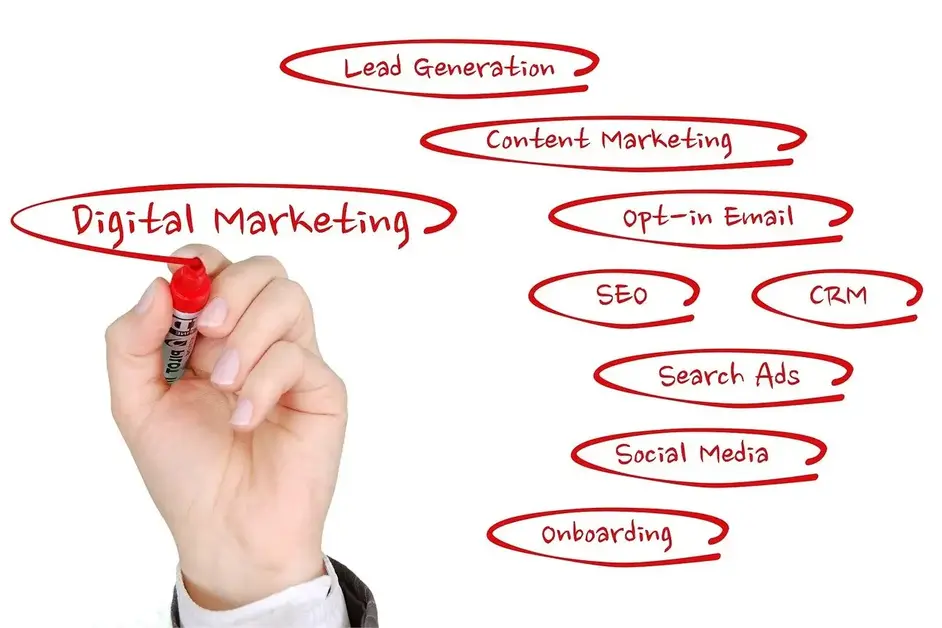
In today’s digital age, businesses increasingly use digital marketing strategies to reach their target audience, enhance brand visibility, and drive sales. It is also known as online or internet marketing, which leverages digital channels to reach and engage with target audiences, drive brand awareness, and boost sales. These digital avenues provide businesses unique opportunities to connect with their target audience in a personalized and impactful manner. By leveraging digital channels effectively, companies can achieve their marketing goals efficiently and cost-effectively.
Digital marketing encompasses a wide range of tactics and channels that leverage the power of the internet and digital technologies to promote products and services. This article will explore digital marketing, why it is crucial, and the benefits it offers to businesses.
What Is Digital Marketing
Digital marketing uses digital channels, such as websites, search engines, social media platforms, email, and mobile apps, to connect with current and potential customers. It involves various online marketing strategies to reach target audiences, generate leads, and drive conversions.
Why Digital Marketing Is Important
Digital marketing has become essential for businesses of all sizes. It allows companies to reach a global audience regardless of geographical boundaries. This broadens the potential customer base and increases market opportunities. Compared to traditional marketing methods like TV ads or print media, digital marketing is more budget-friendly. Businesses can achieve significant results with lower investment costs. One of the essential advantages of digital marketing is the ability to track and measure campaign performance in real-time. Metrics such as website traffic, conversion rates, and engagement levels provide valuable insights for optimization.
Digital marketing enables precise targeting of specific demographics, interests, and behaviors. This targeted approach ensures marketing efforts are directed towards the most relevant audience segments. Through digital channels such as social media, content marketing, and search engine optimization (SEO), businesses can increase brand visibility and awareness among their target audience. Digital marketing encourages two-way communication between companies and customers, fostering engagement and building customer relationships.
Digital Marketing Channels And Strategies
Digital marketing encompasses a diverse array of channels and strategies, each serving unique purposes and reaching different segments of the target audience. Here’s a detailed look at some key digital marketing channels and their corresponding strategies:
Social Media Marketing
Social media marketing is a dynamic and influential strategy that leverages platforms like Facebook, Instagram, Twitter, LinkedIn, and others to connect with audiences, build brand awareness, and promote products and services. It encompasses a range of activities, including content creation, community engagement, and paid advertising. Through social media marketing, businesses can interact with their target audience in real-time, share valuable content, and foster meaningful relationships. This approach allows for personalized communication, targeted campaigns, and data-driven insights to optimize performance and achieve marketing goals. Social media platforms provide potent tools for audience segmentation, analytics, and campaign management, making them essential components of a comprehensive digital marketing strategy.
SEO
Search Engine Optimization (SEO) is a fundamental aspect of digital marketing focused on improving a website’s visibility and ranking on search engine results pages (SERPs). It involves a combination of strategies and techniques to optimize website content, structure, and performance to enhance organic (non-paid) traffic from search engines like Google, Bing, and Yahoo. SEO encompasses various elements such as keyword research, on-page optimization, off-page optimization, technical SEO, and user experience (UX) optimization. SEO aims to increase website relevance, authority, and trustworthiness in the eyes of search engines, leading to higher rankings, more organic traffic, and, ultimately, improved online visibility and business growth.
Mobile Marketing
Mobile marketing engages users on mobile devices such as smartphones and tablets. This includes strategies like mobile-friendly website design, mobile apps, SMS marketing, and in-app advertising. Mobile marketing aims to deliver seamless user experiences, target audiences based on location and behavior, and drive conversions through optimized mobile campaigns.
Content Marketing:
Content marketing involves creating and distributing valuable, relevant content to attract and engage a target audience. This content can take various forms, such as blog posts, videos, infographics, eBooks, etc. Content marketing aims to educate, entertain, and inspire audiences, establish brand authority, and drive organic traffic and customer engagement.
Email Marketing
Email marketing involves sending targeted and personalized emails to nurture leads, promote products/services, and maintain customer relationships. This strategy includes segmentation, automation, and personalization to deliver relevant content and offers to subscribers. Email marketing effectively builds customer loyalty, drives conversions, and generates repeat business.
PPC (Pay-Per-Click) Advertising
PPC advertising is a paid advertising model where businesses pay for ad placements based on clicks. This includes platforms like Google Ads, Facebook Ads, and other ad networks. PPC campaigns target specific keywords, demographics, and interests to reach potential customers and drive immediate traffic and conversions. Advertisers can track performance metrics and optimize campaigns for maximum ROI.
Benefits Of Digital Marketing
The benefits of digital marketing extend across various aspects of business growth and success:
- Increased ROI (Return on Investment): Digital marketing campaigns often yield higher returns on investment than traditional marketing methods, thanks to their targeted nature and measurable results.
- Flexibility: Digital marketing allows quick adjustments and optimizations based on real-time data and market trends. This agility is crucial in responding to changing customer needs and market dynamics.
- SMART Goals: Digital marketing strategies are aligned with SMART goals – Specific, Measurable, Achievable, Relevant, and Time-bound. This ensures clear objectives and effective performance tracking.
- Digital Marketing Budget Optimization: With digital marketing, businesses can allocate their marketing budgets more efficiently by focusing on high-impact channels and tactics that deliver tangible results.
Best Practices And Strategies

To maximize the effectiveness of digital marketing efforts, businesses should follow these best practices:
- Define Clear Objectives: Set SMART goals and KPIs (Key Performance Indicators) to measure success and track progress.
- Know Your Audience: Conduct market research to understand your target audience’s preferences, behaviors, and pain points.
- Create Compelling Content: Develop high-quality, engaging content that resonates with your audience and provides value.
- Optimize for Mobile: Ensure that your website and marketing campaigns are mobile-friendly and accessible across devices.
- Monitor and Analyze Performance: Use analytics tools to track campaign performance, gather insights, and make data-driven decisions.
- Stay Updated: Keep abreast of digital marketing trends, algorithm changes, and best practices to stay competitive and relevant.
In conclusion, digital marketing is crucial in modern business strategy, offering numerous benefits such as global reach, cost-effectiveness, targeted advertising, and measurable results. By leveraging digital channels, adopting best practices, and implementing effective strategies, businesses can achieve their marketing goals and drive growth in today’s digital landscape.


